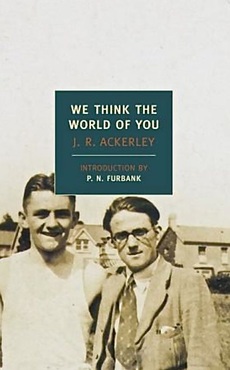A WRITER'S WIT
The creative process is a process of surrender, not control.
Julia Cameron
Born March 4, 1948
A Small But Beautiful World

Several years ago (I’m always behind in my reading and follow-up) in the New Yorker, I became acquainted with writer J. R. Ackerley for the first time. From the same generation as my grandparents, as F. Scott Fitzgerald, he was a British man who published only four books in his life. Seems that it took him a long time in between to develop each one. The novel is about Frank, a young man in London, in love with a man named Johnny, Johnny’s wife, Megan, and Evie, Johnny’s German Shepherd pup.
We Think the World of You is built somewhat around the motif of the cliché embodied in the title. No less that seventeen times does Ackerley employ a form of it to demonstrate the offhand way the characters have of treating one another and Evie. And though the reader notices the repetition, it becomes an acceptable motif.
While we were talking about [Johnny, who is in prison], the scullery door was pushed open and a dog came in.
“Hullo, Evie,” said Millie.
I had forgotten all about Johnny’s dog.
“So this is the creature he wanted me to take?”
“Yes, he couldn’t get no one to mind her, so I had to have her in the end. Not that I wanted her, the scamp.”
She was certainly a pretty bitch, a few months old, rather large and long-legged, and lavishly affectionate in the fawning, insinuating way puppies have (22).
How she loved running, using her muscles, her strong young limbs! If Tom or the rebuffed boy took her out every day on the lead round these mean streets what use would that be to her? She ought to be bounding a daily ten miles over grass. She ought to be in the country (59).
It was now, as the rest of our garments followed, that Evie began to exhibit an increasing perturbation as though whatever was happening before her eyes was having, upon the confidence she had hitherto shown in the distinctness of our identities, a confusing effect. Uttering little quavering cries of doubt and concern, she sat first upon our mingled clothes, gazing at us with wild surmise, then upon our mingled bodies, excitedly licking our faces as though she would solve her perplexing problem either by cementing them together with her saliva or by forcing them apart. She lay with us throughout the afternoon, her fur against our flesh, and we talked of her most of the time (177).
“Did you mean what you said about the forty quid?’
“Of course.”
“Give it to me,” said he roughly.
In this way Evie became my dog.
Advancing age has only intensified her jealousy. I have lost all my old friends, they fear her and look at me with pity or contempt. We live entirely alone. Unless with her I can never go away. I can scarcely call my soul my own. Not that I am complaining, oh no; yet sometimes as we sit and my mind wanders back to the past, to my youthful ambitions and the freedom and independence I used to enjoy, I wonder what in the world has happened to me and how it all came about . . . . But that leads me into deep waters, too deep for fathoming; it leads me into the darkness of my own mind (209).
WEDNESDAY: TRIP TO A CASINO


 RSS Feed
RSS Feed